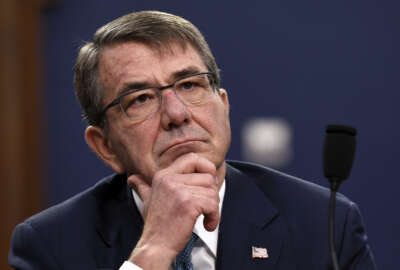
Carter urges momentum for ‘force of the future’ initiatives at DoD
Former Defense Secretary Ash Carter has urged his successor, former Marine Gen. James Mattis, to continue fostering relationships with tech innovators as part of...
As the Trump administration appears poised to give the Pentagon as much as $54 billion in increased funding next fiscal year, former Defense Secretary Ash Carter has urged his successor, former Marine Corps Gen. James Mattis, to continue fostering relationships with tech innovators as part of his drive to create a “force of the future.”
Looking back at his nearly two-year tenure as defense secretary and a 35-year career in national security, Carter urged the new administration to continue making inroads with Silicon Valley and other tech hubs across the country.
“We set out to build and to rebuild bridges between the Pentagon and America’s technology community,” Carter said Tuesday during his keynote address before the Atlantic Council. “The bridges between tech-driven change and public purpose need to be repaired and restored in fields well beyond defense. These bridges don’t maintain themselves.”
Before assuming his new role as the director of the Belfer Center for Science and International Affairs at Harvard University’s Kennedy School of Government, Carter touted the success of programs he’d like to see further developed by the new administration, such as the Defense Innovation Unit Experimental (DIUx), which connects DoD with startups and commercial tech firms in Silicon Valley and regional hubs like Austin, Texas and Boston, Massachusetts.
“Just last week, I visited with DIUX leadership and saw firsthand the success they’ve had not only in facilitating dozens of deals with tech companies that were not previous postured or had any experience working with DoD, but also how the military services have begun to exploit the benefits of building bridges — thinking differently about procurement and using tech to improve their own systems and processes,” Carter said.
While Carter acknowledged the present-day threats posed by the Islamic State, Russia, Iran and North Korea, he also warned Mattis of “unforeseen challenges and opportunities that an unpredictable future might hold.”
Part of that future, according to Carter, involves doubling down on DoD’s role as the preeminent investor in research and development. In the Pentagon’s fiscal 2017 request, it asked for $72 billion for its R&D budget — more than double what Apple, Intel and Google spent combined in 2015, Carter said.
“We pushed the envelope with research and development, despite the unconscionable budget environment in Washington, to stay ahead of our competitors,” he said.
On the personnel side, Carter highlighted some of the “force of the future” initiatives he pioneered at the Pentagon.
“At DoD, the source of American power, as well as my greatest joy in the job, came from the young people who make up the spine and the future of the force … the other source of strength is the tendency of the organization as a whole to be able to change and innovate,” he said. “We ensured that DoD was a place where thinking boldly and differently was fostered.”
One program, the Defense Digital Service, sought to recruit tech talent from outside the uniformed service to work on DoD projects for a limited period of time. Carter said those who participated were eager to take on challenges unique to the Defense Department.
“Many of them — a growing number of them— are extremely and increasingly receptive to the commitment and the responsibility to serve the public good. After all, these are people driven by a desire to do things of consequence,” he said.
Another one of Carter’s projects, the Defense Innovation Board, has invited some of the top names in tech, like Eric Schmidt, board chair and executive chairman of Alphabet to tackle some of DoD’s longstanding problems, like harnessing its massive stores of data, from an outside perspective.
“As Secretary of Defense, I challenged the Pentagon, as I used to say, to think outside of its five-sided box. We needed to be willing to change how we invested and how we innovated, how we planned and how we fought, and how we recruited and retained personnel,” Carter said.
Copyright © 2025 Federal News Network. All rights reserved. This website is not intended for users located within the European Economic Area.
Jory Heckman is a reporter at Federal News Network covering U.S. Postal Service, IRS, big data and technology issues.
Follow @jheckmanWFED




